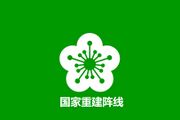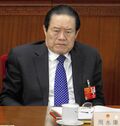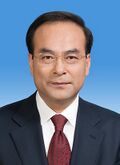National Reconstruction Front (Daxia)
National Reconstruction Front 我们这件事 | |
|---|---|
| General Secretary | Trang Shesh |
| Headquarters | Mirzak, Daxia |
| Newspaper | National Voice |
| Youth wing | Nationalist Wave Association |
| Membership (2027) | 20,143 |
| Ideology | Big tent Pragmatism Dirigisme Revolutionary Nationalism |
| Colors | Light Green, White |
| Assembly of the People | 13 / 500 |
| State Assembly (Daguo) | 7 / 40 |
| State Assembly (Xing) | 4 / 40 |
| State Assembly (Sanyu) | 2 / 40 |
| State Assembly (Pingu) | 8 / 40 |
| Party flag | |
 | |
The National Reconstruction Front is a centre-right big tent and founding political party of the Democratic Republic of Daxia. The NRF currently holds 13 out of 500 (2.6%) seats in the Assembly of the People and has legislative presence in four provinces but no governorships. Founded in 1951 by Qiu Heng by agglutinating several pro-government associations , war veterans's clubs and emerging labor organizations; the NRF maintained absolute and uninterrupted state power from 1951 to 1992 and presided over a dominant party system with no corresponding checks and balances to its authority. This system was maintained by a combination of corporatism, coercion and repression. Having being founded and led by army officers from its inception, the NRF was notably militarist, intervening in the Rusani Civil War on the side of the NCDP with the 'Little Incursion' in 1962 and helping the government of Canpei crush the democratic protests known as the Revolution of Dignity in 1984.
Established originally as a civi movement called the National Daxian Rally to support Dai Hanjian's 'Glorious Revolt' that toppled monarchical rule, it and later the rebranded NRF provided him and the military rulers after him with a wafer-thin veneer of democratic legitimacy that was renovated by elections that were never free nor fair and often without any candidates to oppose the NRF. Upon its 1992 defeat in national elections the party rapidly lost power and positions in the government bureaucracy, it was subjected to various corruption investigations (former president Tao Zexian was imprisoned for 3 years) and was eventually banned by the electoral board from 1993 to 1999. The party was greenlighted to participate in the elections of the year 2000 where it got around 2 percent of the votes cast and regained small representation in local assemblies. Ostensibly independent, the NRF has reinvented itself from being a party of power into what is now considered by political analysts to be an inconditional, submissive ally and political satellite organization of the Party of Daxian Democrats.
During its almost five decades in power the party went from favoring center-left, statist economic policies to preferring a more mixed model with some market oriented reforms that included privatization of certain state industries and abandoning import substitution programs. This ideological evolution however did not touch the economic interests of the Army which continued to have an outsized political and economic influence until the end of the regime. The NRF created many of Daxia's modern institutions such as the independent National Bank in charge of fiscal policy, a well funded public healthcare system and the bloated security organs. The current General Secretary of the party is Trang Shesh.
History
Foundation and Qiu Heng era

Qiu Heng's rise to the leadership of the country saw for the first time the ascendance of politics over purely military leadership; Qiu Heng saw the perpetuation of the military junta system as inherently unstable, absent an electoral mandate and the legitimacy it could bring, any ambitious general in charge of a military zone could feel themselves justified in attempting to take power the same way as the junta did in the first place. Since Qiu distrusted the established but outlawed old political parties and their cadres, he decided instead on building a new party from the ground up without 'any of the old chaff'. As the base of his new party of state he chose a pro-military civic association called the National Daxian Rally-NDR that had existed since 1945 but had never reached much relevance. The NDR had been started at the behest of military intelligence and was originally led by people close to it. Qiu directed the Ministry of Social Services and the Ministry of Finance to direct significant financial resources to the NDR to support its growth into a real national party that could hold on to power.
The junta leader himself joined the NDR in the spring of 1951 and was elected its General Secretary 'by acclamation' of the party delegates during the founding congress. This was followed by a massive surge in party membership as government employees joined en masse(to curry favor, preserve their jobs or genuine agreement with its programme and ideals), trade unions and government contractors enjoined their affiliates and employees to do the same. In this early stage the biggest labor union of the country, the then All-Daxian Workers Central Union negotiated generous terms on collective bargaining and perks for its members in exchange for its unrestricted support for the new political machinery. In accordance with the Basic Law passed earlier on the year, Qiu Heng announced the first national elections for President and a new National Assembly would take place concurrently in late 1951, he also announced his candidacy at the head of the now renamed National Reconstruction Front-NRF. Qiu Heng correctly deduced that the vast masses of the Daxian people were accustomed to strongman rule and yearned for stability, and so he presented himself to the public as the one leader who could be a guarantor of stability, social peace and economic growth without disruptions. Notwhitstanding that none of the other parties had ever held political power, they were decried as 'dangers to Daxia' that would collapse the country with their radicalism and hatred of traditional values. The NRF freely used government resources in the campaign, blatantly busing its supporters in military vehicles. The election was a comprehensive stomp where Qiu Heng and his party won 73% of the vote.
During this formative period the party embraced nationalism(it did not shy away from traditional Daxian chauvinism), center-left dirigist economic policies and supported the formation of social welfare programs. The latter two aspects helped it take the wind out of the sails of the CPD's support, who the NRF saw as its most dangerous opponent. Its dirigist and strong handed economic policies served well to steer the slowing Daxian economy back to growth and deal with the entrenched plutocratic interests that had become a holdover from the Qian system of patronage. Henceforth the economic powers would be subordinated to the political authority of the center and those that resisted this process would be pushed aside, their assets taken away and cannibalized by other actors. One aspect that is very criticized of Qiu Heng's economic handling is his decision not to decisively curtail the involvement of the military on economic activity. He allowed the army and figures linked to it to handle a number of lucrative companies, one such being the construction behemoth of the North Crona Production and Construction Corporation, much corruption was derived from these activities and would grow to become an issue that would cost the party much support.
Internally the party under Qiu Heng did not show many signs of institutional maturation, its internal party laws and processes were an afterthought, there were no regular party congresses or meetings to discuss policy or ideological subjects. Qiu Heng seemed to regard it as merely an electoral tool and he was not interested in it being anything more. This attitude began to change during his third term of office when his health began to fail him, the issue of succession began to be a topic of special consideration and the party would be needed to make the an eventual transition a smooth one.
Chi Long Qua era
Min Bib Doda era
Yang Qiu era and the Slow Death
Tao Zexian era and collapse
Persecution of remnants
Rehabilitation
Ideology
List of General Secretaries
| No. | General Secretary | Portrait | Took office | Left office |
|---|---|---|---|---|
| 1 | Qiu Heng (1902-1964) | 
|
1951 | 1964 |
| 2 | Chi Long Qua (1905-1972) | 
|
1964 | 1972 |
| 3 | Min Bib Doda (1913-1985) | 
|
1972 | 1980 |
| 4 | Yang Qiu (1922-1999) | 
|
1980 | 1988 |
| 5 | Tao Zexian (Born 1945) | 
|
1988 | 1992 |
Electoral History
Presidential elections(1951-1988)
| Election | Party candidate | Popular vote | % | Result |
|---|---|---|---|---|
| President elected by popular vote | ||||
| 1951 | Qiu Heng | 210,653,846 | 73% | Elected |
| 1956 | 262,595,890 | 91% | Elected | |
| 1960 | 274,138,566 | 95% | Elected | |
| 1964 | Chi Long Qua | 271,252,897 | 94% | Elected |
| 1968 | 252,366,896 | 89% | Elected | |
| 1972 | Min Bib Doda | 335,483,645 | 93% | Elected |
| 1976 | 358,654,823 | 97% | Elected | |
| 1980 | Yang Qiu | 295,365,655 | 83% | Elected |
| 1984 | 225,651,211 | 69% | Elected | |
| 1988 | Tao Zexian | 278,356,983 | 52% | Elected |